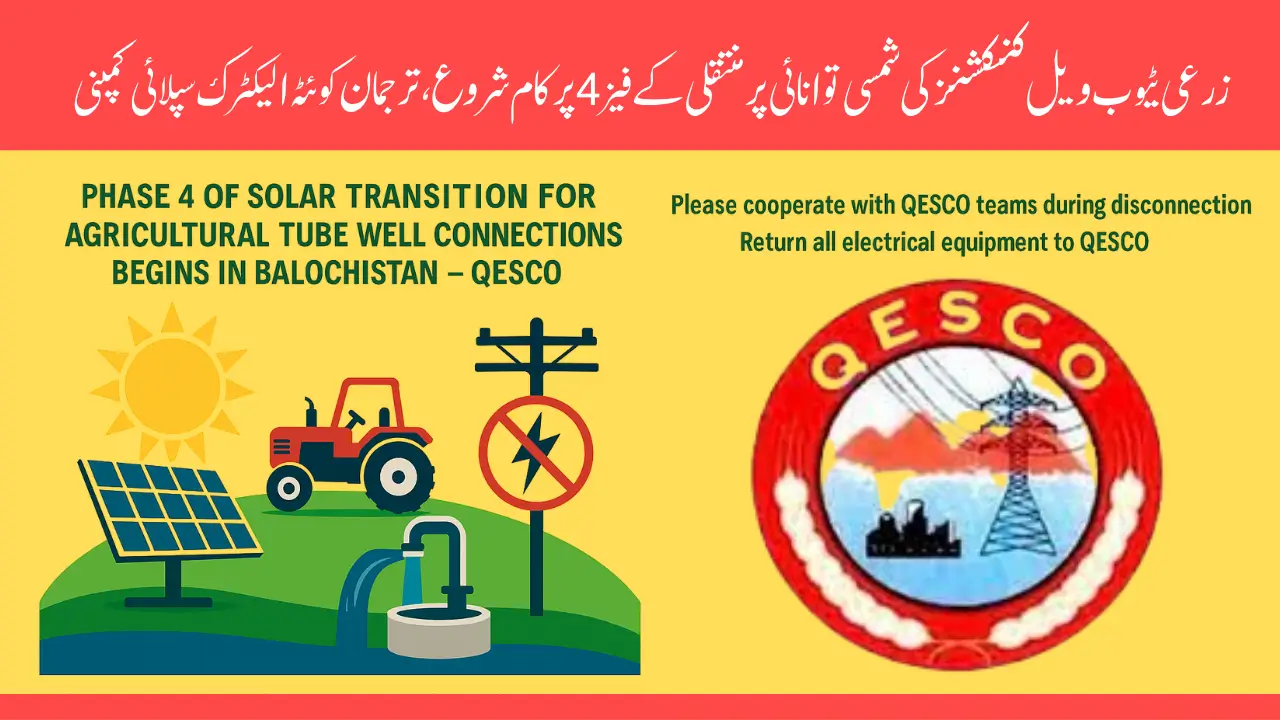
Solar Transition Agricultural Tube Well Connections
Did you know that thousands of agricultural consumers in Balochistan are now saying goodbye to their old electricity connections? Yes Solar Transition Agricultural Tube Well Connections Quetta Electric Supply Company (KESCO) has launched the fourth phase of its project to convert agricultural tubewell connections to solar energy. In this phase, the electricity connections of 12,250 landowners across the province are being disconnected, who have been provided a huge amount of Rs 24.5 billion by the government to switch to solar systems.
Interestingly, KESCO is not just disconnecting electricity but is also removing transformers, HT poles and all other electrical equipment so that these agricultural connections cannot be restored under any circumstances. The aim of this move is not only to reduce the electricity load but also to make Balochistan’s agricultural sector self-sufficient and eco-friendly. The government says that three phases of this project, which will start in December 2024, have already been successfully completed.

If you want to know how beneficial this change is for agricultural consumers, and how the government and KESCO are appealing to farmers for cooperation, then read the full article. It not only contains facts but also shows a glimpse of a new and bright Balochistan where farmers will own their own energy, free from electricity bills and self-sufficient in agriculture.
Read More info: Punjab CM e-Taxi Scheme 2025 to Launch in August – Women Quota, Online Applications, and Easy Installment Plan Finalized
Phase 4 Implementation: Disconnection of 12,250 Tube Wells Begins
As part of Phase 4, QESCO has started the process of disconnecting 12,250 agricultural electricity connections across various regions of Balochistan. These disconnections are only being carried out for those farmers who have already received funds from the government to shift their systems to solar power.
According to the QESCO spokesperson, this step ensures that the government’s investment in solar transition for agricultural tube well connections is used properly and efficiently.
Government Support: PKR 24.5 Billion Allocated
To support this solar initiative, the government has already released PKR 24.5 billion to eligible agricultural consumers under Phase 4. This financial assistance is aimed at helping farmers set up their solar tube well systems and reduce their long-term operational costs.
With this funding, farmers are expected to switch their irrigation systems to solar power, which will significantly lower electricity consumption and boost energy sustainability in the province.
Read More info: 8171 CNIC Verification BISP Payment Insight Check Digital ID Confirmation and 13500 Track
Technical Disconnection by QESCO Teams
After verifying the fund disbursement, QESCO teams have started disconnecting traditional power supply from the targeted tube wells. This includes:
- Removing transformers
- Taking down HT poles (high-tension poles)
- Detaching other electrical equipment linked to the grid
This ensures that the disconnected connections cannot be illegally reconnected to the QESCO network, maintaining the integrity of the solar transition project.
Success of Previous Phases
The government’s initiative began in December 2024, and Phases 1, 2, and 3 have already been successfully completed. Thousands of agricultural tube wells have already been disconnected and transitioned to solar energy.
This success sets a strong foundation for Phase 4, and shows the government’s commitment to sustainable agricultural development in Balochistan.
QESCO Appeals for Cooperation
QESCO has issued a public appeal to all farmers included in Phase 4 of the solar transition. The company urges them to:
- Cooperate with QESCO teams during disconnection
- Return the agricultural transformers, HT poles, and other electrical components
- Avoid any attempt to reconnect to the power grid
This cooperation is essential for the smooth and successful implementation of the project.
Conclusion
The solar transition of agricultural tube well connections is a major step toward a cleaner and more energy-efficient future for Balochistan. With Phase 4 now underway, thousands of farmers will soon benefit from reduced electricity bills and more reliable irrigation systems.
This project not only supports farmers but also reduces the burden on Pakistan’s national electricity grid and promotes the use of renewable energy. The partnership between the government, QESCO, and local farmers is creating a brighter, greener future for agriculture in the region.
Read More info: BISP Registration July 2025 Guide for First-Time & Returning Applicants
FAQs
When did the solar transition project for agricultural tube wells begin?
The project began in December 2024, initiated by the federal and provincial governments in Balochistan.
Which phase of the project is currently in progress?
Phase 4 is currently underway, focusing on disconnecting 12,250 agricultural tube well connections.
Whose connections are being disconnected in Phase 4?
Connections of those farmers who have already received government funds to shift to solar energy.
What equipment is QESCO removing during disconnection?
QESCO is removing transformers, HT poles, and other electrical equipment to prevent reconnection to the grid.
What has been the outcome of the previous phases?
Phases 1, 2, and 3 have been successfully completed, and all related tube well connections have been disconnected.
What is QESCO requesting from the farmers?
QESCO is urging farmers to cooperate with teams during disconnection and return all related electrical equipment.
How much funding has the government provided in Phase 4?
The government has released PKR 24.5 billion for the 12,250 agricultural consumers included in Phase 4.